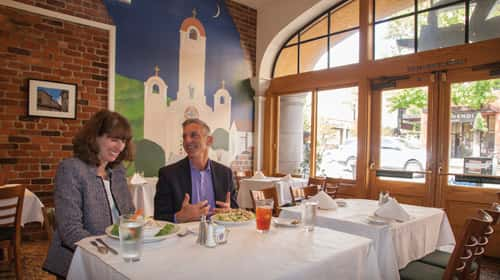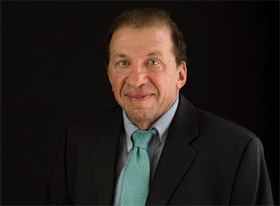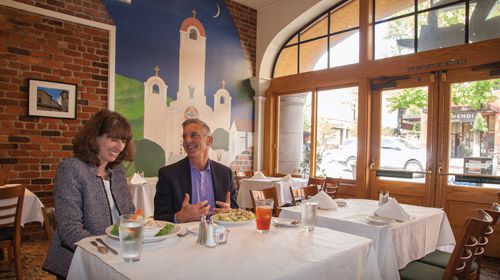
Great ideas have a way of catching people by surprise, especially when a missing piece suddenly emerges, putting what was previously just a good thought on the path to reality.
Such was the case with Eckhoff and Company (EAC) Certified Public Accountants (CPAs) and advisors in San Rafael, which launched a strategic joint venture with an all-new business, Eckhoff Wealth Management (EWM), in June 2017. The idea for the new partnership took shape, when Michele Hassid, managing partner at EAC, and Bruce Frankel, a certified financial planner who is managing partner at EWM, met for lunch a couple of years ago. Frankel was with another company, but he and Hassid had been referral partners, sharing their expertise and consulting with each other on a range of issues for more than 10 years. The conversation took an unexpected turn, when Hassid commented that she wondered what it would be like if Frankel were to work at Eckhoff. It wasn’t an entirely new idea. “A few years ago, we started talking about how the ideal thing would be to create one full-service, integrated, independent financial-services firm,” says Frankel. This time, though, the concept crystallized when they realized they could take the initiative and do it themselves. They made the decision to pursue it on the spot and set out to create a business model that would offer a full range of financial services all under one roof in an innovative and mutually beneficial partnership.
Deciding to put the idea into action was the easy part. Once they’d made the commitment, Hassid and Frankel had to figure out how to make it happen, which turned out to be a time-consuming process. They started by doing research and reached out across the country to find the kind of partnership they envisioned. But as Frankel says, “We didn’t find small to mid-sized firms like this at all.” Thus, they had to start from scratch and create a new model. “It was a lot of work,” he says. According to Frankel, much of the work was related to understanding legal and regulatory rules, which required the two entities to be separate and in compliance with different sets of laws. They also had the challenge of communicating effectively with 1,200 clients to explain the new joint venture to them and make sure they understood its purpose, as well as Eckhoff’s reasons for doing it.
Wealth of experience
The plan’s success depended on the experience of Hassid and Frankel in their respective fields and the reputation of a well-established firm. Eckhoff and Company goes back to 1955, and while it has had two name changes over the years, it has always been a full-service CPA firm, offering services such as the preparation of tax returns, independent audits and accounting work that includes bookkeeping and financial statements. “We have about 29 people in all areas of expertise, who provide comprehensive services,” says Hassid. A CPA, she is a graduate of San Francisco State University, where she earned a degree in accounting, and she began working at an accounting firm after college. In addition, she and her husband have extensive knowledge of business operations. “My husband and I have had 14 businesses,” she says. As a result, she’s able to view issues from a client’s side as well as that of an accountant. “It’s a real-life understanding of what our clients are dealing with,” she says, adding that experiencing the challenges of running a business on a day-to-day basis herself gives her a broader perspective and allows her to develop empathy for clients.
Frankel started consulting and managing other people’s businesses in Carmel and Pebble Beach 34 years ago and discovered that almost everyone can benefit from professional financial services. “You start to realize that some of the most sophisticated and well-off people don’t have their [financial] affairs in order.” He enjoyed helping them so much that he became a certified financial practitioner and embarked on working on wealth management fulltime. Initially, he spent time helping start-ups in Silicon Valley, and then he established a company in France and did consulting all over the world. When he returned from Europe in 2002, he settled in Marin County, which eventually led him to Eckhoff and a new chapter in a satisfying career. Reflecting on the experience he and Hassid bring to the joint venture, he says, “We’re at an age where we have this massive amount of knowledge in our heads. Now we’re in a position where we can really help other people make their impact in the world. We’ve put together this business that’s immensely powerful. Bigger firms don’t always have this diversified knowledge.”
A new model
With Hassid and Frankel at the helm as managing partners, along with wealth management partner Eric Briese, a CPA with experience in accounting and management, EAC and EWM celebrated the first anniversary of the joint venture in June, and at one year plus, it appears to be thriving. “What we’re offering to our clients is a one-stop shop,” says Hassid, who observes that Eckhoff is able to provide integrity in a culture that allows the team to serve clients in a comprehensive way as trusted advisors. That trust is one of the keys to the partnership’s success. “We are in the unique position of being so intimate and close with our clients that we know information that spouses or other family members don’t always know,” she adds. It’s a special position that allows staff members to have an impact and assist clients at a deep level, she explains. With that comes a responsibility that they take very seriously, as they help people to make important decisions that affect them and their families.
The goal is to provide independent fiduciary advice. “It’s incumbent on us to not just make suggestions and recommendations, but also act in the best interest of the client,” says Frankel. To give clients that level of service requires being selective. “We’re a high-touch firm. We’re not just cranking clients through,” he says, describing the Eckhoff companies as concierge rather than cookie cutter, so they and their clients have to be good matches for each other. He believes that one of the reasons the partnership works is because Hassid is a forward thinker who thinks differently than the average CPA and realized that financial advisors could fill an important role on-site. He points out that accountants and wealth managers study different coursework when they’re studying to be either an accountant or wealth manager, and so their practical work with clients isn’t the same. Traditionally, the two fields were compartmentalized. “We bounced clients around from advisor to advisor,” he explains. And if the advisors didn’t agree, the client was caught in the middle. “We shouldn’t be winging it when clients have questions,” he says. “Instead, advisors should be working together as a team for the benefit of the client.”
Hassid explains that the joint venture allows a team approach within the firm, so clients no longer have to spend time going elsewhere. Instead, one advisor can simply walk down the hall to ask questions of a colleague who has expertise in a particular area. Or, several professionals can sit around a table to hash out the issues and then take their recommendations to a client. To make it even more effective, “We’re putting together a mastermind group,” she says. The group will include specialists in varied fields, such as insurance and real estate, allowing team members to get the all the information they need in-house.
Integration
 Ron Moss is a CPA and licensed attorney, who specializes in individual taxes and has been at EAC, where he is director of tax, since 2001. “My goal is to minimize your taxes and maximize your wealth. I want clients to pay the minimum tax they can that’s legally allowable,” he explains. It’s important because being in a good financial position allows people to live the kind of lifestyles they want, he adds. When he first heard that Eckhoff was planning to introduce a new model that integrated accounting with wealth management, he knew it would be a winning partnership. “I was excited,” he says. He points out that the largest expense anyone has is taxes, so it’s essential to do them properly. However, he finds that tax clients often have questions about their investments that he can’t answer, and it’s an advantage to have tax and investment professionals in close proximity so they can work together to discuss the tax and investment implications and find the best strategies for clients. For example, a wealth-management client in her late 60s owns stock she inherited from her father. He probably acquired them for $1 a share, but now they’re worth $100 each. She hasn’t paid taxes on them yet and needs advice, so she won’t pay more than necessary. “It’s great to have us right here,” says Moss. He adds that having accountants and wealth managers working together is essential. “I just love the relationship. I’m excited about having both entities in the same building,” he says. “It’s very positive. I think EWM rolled it out the right way.”
Ron Moss is a CPA and licensed attorney, who specializes in individual taxes and has been at EAC, where he is director of tax, since 2001. “My goal is to minimize your taxes and maximize your wealth. I want clients to pay the minimum tax they can that’s legally allowable,” he explains. It’s important because being in a good financial position allows people to live the kind of lifestyles they want, he adds. When he first heard that Eckhoff was planning to introduce a new model that integrated accounting with wealth management, he knew it would be a winning partnership. “I was excited,” he says. He points out that the largest expense anyone has is taxes, so it’s essential to do them properly. However, he finds that tax clients often have questions about their investments that he can’t answer, and it’s an advantage to have tax and investment professionals in close proximity so they can work together to discuss the tax and investment implications and find the best strategies for clients. For example, a wealth-management client in her late 60s owns stock she inherited from her father. He probably acquired them for $1 a share, but now they’re worth $100 each. She hasn’t paid taxes on them yet and needs advice, so she won’t pay more than necessary. “It’s great to have us right here,” says Moss. He adds that having accountants and wealth managers working together is essential. “I just love the relationship. I’m excited about having both entities in the same building,” he says. “It’s very positive. I think EWM rolled it out the right way.”
Hassid reports that the response of clients to the joint venture has been positive. They say it’s what they need, and they like the comprehensive approach. Their questions often include whether or not to retire, when to take social security or the best way to save for a child’s college education. Rather than just figures, “It’s working with clients at a higher level. That’s where the value is,” she says. When members of the team work together and share information, they get a complete picture of a client’s position and can make the best recommendations. In addition, regular reviews show whether clients are on track with their financial plans so they can determine whether their timeline for retirement is realistic, for example, or find out what the impact will be on their income and taxes if they sell real estate. “We do it all in one meeting,” says Hassid. And the same model applies to businesses as well as individuals. It might require helping business owners get ready to make transitions or make a plan to exit a business.
Similar issues exist when people own real estate that they depend on for income. “These real-estate owners are business owners but don’t always realize it,” says Frankel. If a property isn’t performing well, EWM can help evaluate the owner’s real-estate portfolio and review alternative options.
Sometimes, despite careful planning, people discover that their financial plans haven’t worked out the way they expected. “When you do financial planning work, sometimes you have to give people bad news,” says Frankel. He recalls a client who wanted to retire but had to keep working, so he assisted her to create a plan that would help her to achieve her goal.
A second look
Moss finds that free second-opinion reviews are also beneficial for his clients who handle their own investment portfolios. They do a good job, but often find it stressful. “I think it’s scary how you invest your money,” he says, and to have an expert in wealth management do a review is often beneficial. “We are an advisor. We don’t just do taxes. A lot of our clients are excited about the second-opinion service,” Moss adds. Some clients even felt so comfortable with Hassid, Frankel and Briese that they decided they didn’t want to be responsible for their investments any more and retained EWM instead.
The ultimate goal is do what’s right for clients. “We’re here to help,” says Hassid, explaining that using her knowledge and experience for other people’s benefit is very fulfilling and satisfying. “You’re giving them peace of mind. You’re helping them, because they know where they stand. It’s also fun to help them cut their tax bill,” she says, reporting that EAC just helped a client with savings of at least $100,000. “Think of what they could do with that money.”
“We just have this passion for helping. It’s a great position for us to do that, says Frankel. He points out that when clients make financial gains, they have the power to make an impact. “We’re in a good spot,” he concludes. The new model is working, and at a little more than a year in, it’s only just begun.
Integrated Services
Eckhoff and Company and Eckhoff Wealth Management, LLC offer a range of financial services as separate companies to comply with federal regulation, but in an integrated model that allows them to meet all their clients’ needs in-house.
Eckhoff and Company
- Audit and accounting
- Business tax and management
- Income tax management
- Strategic performance management
- Wealth management and retirement services
www.eckhoff.com
Eckhoff Wealth Management
- Comprehensive financial planning
- Financial second opinion
- Wealth management and retirement planning
The Role of Technology
The financial business is constantly changing, and technology plays a big role. Many people use software to do their own tax returns for instance, and Frankel reports that IBM is training Watson to do tax returns as well. Eckhoff considers technology that allows people to do financial tasks themselves a jumping off point that’s a basis for planning, not a replacement. Frankel gives QuickBooks as an example. Bookkeeping was a traditional part of accounting firms, and when Quickbooks emerged, they expected to lose business. However, users didn’t necessary understand it well and needed help with corrections. As a result, even though they use technology, clients still need the expertise and advice of professionals to understand the documents and determine if they are running their businesses as efficiently as they could. On the investment side, Robo-advisors, which allow individuals to make investments and manage money online, are growing. “I believe more and more people will adopt that,” says Frankel. Nevertheless, they’ll still need advisors to help them evaluate their decisions and decide if they’re the right ones. If the government continues to change the tax code, it will bring additional challenges.
Learning to Avoid Mistakes
Bruce Frankel’s book, The 7 Biggest Financial Mistakes Made by Successful Entrepreneurs and What to Do About Them, is a resource for small to mid-size business owners to help them learn from other’s mistakes. It’s not about making mistakes as much as it is learning about the ones other people make and turning them into opportunities. “John’s mistakes become Jane’s opportunities,” he says. “That’s what I want people to learn so they don’t make those mistakes and can learn how to avoid them.”




